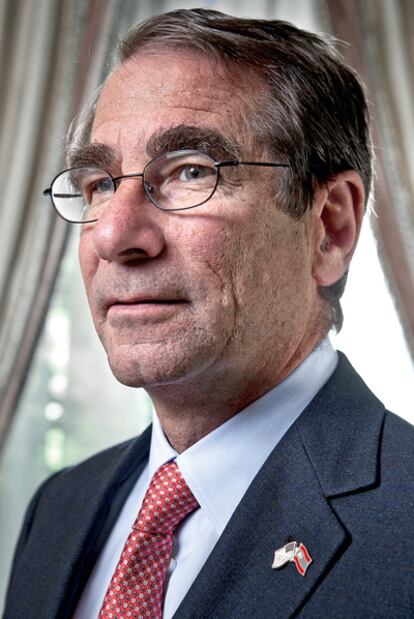US slammed Zapatero for not passing "Sinde" anti-piracy law
Washington threatened to return Spain to illegal downloading blacklist
The US ambassador in Madrid used a December 12 letter to express his nation's anger at former Prime Minister José Luis Rodríguez Zapatero's decision not to pass the so-called "Sinde" anti-downloading law in the last days of his term of office.
In the message to Moncloa, to which EL PAÍS has had access, Alan Solomont communicated his "profound worry" at the failure to pass the law, which is aimed at preventing unauthorized internet downloads of copyright-protected content.
"The government has unfortunately failed at the hour of finishing the job out of political reasons, to the detriment of Spain's reputation and economy," he wrote.
The ambassador also threw out a few unveiled threats, reminding Spain that it already figured on the Special 301 Report, the Office of the United States Trade Representative's index of countries outlawed due to their poor management of intellectual property. He warned Spain risked being further downgraded and returned to the "Priority Watch List" of "the worst global violators of intellectual property rights." Belonging to that blacklist of countries could carry serious commercial sanctions.
The US Embassy also sent copies of the letter to four members of Zapatero's Cabinet: then Culture Minister Ángeles González-Sinde; ex-Interior Minister Antonio Camacho; former Justice Minister Francisco Caamaño and then Industry Minister Miguel Sebastián.
Ten days before the correspondence, in the penultimate Cabinet meeting of his term, Zapatero had made the surprise decision not to pass the necessary enabling mechanisms for the "Sinde law," named for the ex-minister and cinema script writer who put it together. Zapatero based his decision, which contradicted an announcement made by then Cabinet Secretary Ramón Jáuregui that morning, on the heightened "opposition" that had appeared on the social networks on the eve of the ministerial meeting and the differences of opinion that had arisen among various Cabinet members.
Conscious there was still time for the law to be green-lighted under the Zapatero administration, Solomont issued his warning for the prime minister to implement the measure in order to "safeguard Spain's reputation as an innovative country that does what it says it will do and engenders confidence."
However, the outgoing leader chose not to listen, again failing to approve it in his final Cabinet meeting on December 16.
The US government finally got its wish fulfilled on December 30 when the new Popular Party government of Mariano Rajoy gave the legislation the go ahead. That same day a letter from the president of the US Chamber of Commerce in Spain urging Rajoy to pass the "Sinde law" emerged in the media.
The guiding role of the US in the development of Spanish anti-internet piracy legislation since at least 2007 was confirmed in December 2010 with the publication in EL PAÍS of the WikiLeaks diplomatic cables. The leaked US State Department documents showed Washington had carried out a plan to obtain an anti-download law tailored to the demands of its industry.
The White House's meticulous plan came to influence the government and political parties, as well as representatives of copyright management organizations. Leaked diplomatic correspondence from the Madrid embassy revealed a close collaboration with the General Society of Authors and Editors (SGAE) to create a list of pirate websites.

Tu suscripción se está usando en otro dispositivo
¿Quieres añadir otro usuario a tu suscripción?
Si continúas leyendo en este dispositivo, no se podrá leer en el otro.
FlechaTu suscripción se está usando en otro dispositivo y solo puedes acceder a EL PAÍS desde un dispositivo a la vez.
Si quieres compartir tu cuenta, cambia tu suscripción a la modalidad Premium, así podrás añadir otro usuario. Cada uno accederá con su propia cuenta de email, lo que os permitirá personalizar vuestra experiencia en EL PAÍS.
¿Tienes una suscripción de empresa? Accede aquí para contratar más cuentas.
En el caso de no saber quién está usando tu cuenta, te recomendamos cambiar tu contraseña aquí.
Si decides continuar compartiendo tu cuenta, este mensaje se mostrará en tu dispositivo y en el de la otra persona que está usando tu cuenta de forma indefinida, afectando a tu experiencia de lectura. Puedes consultar aquí los términos y condiciones de la suscripción digital.








































